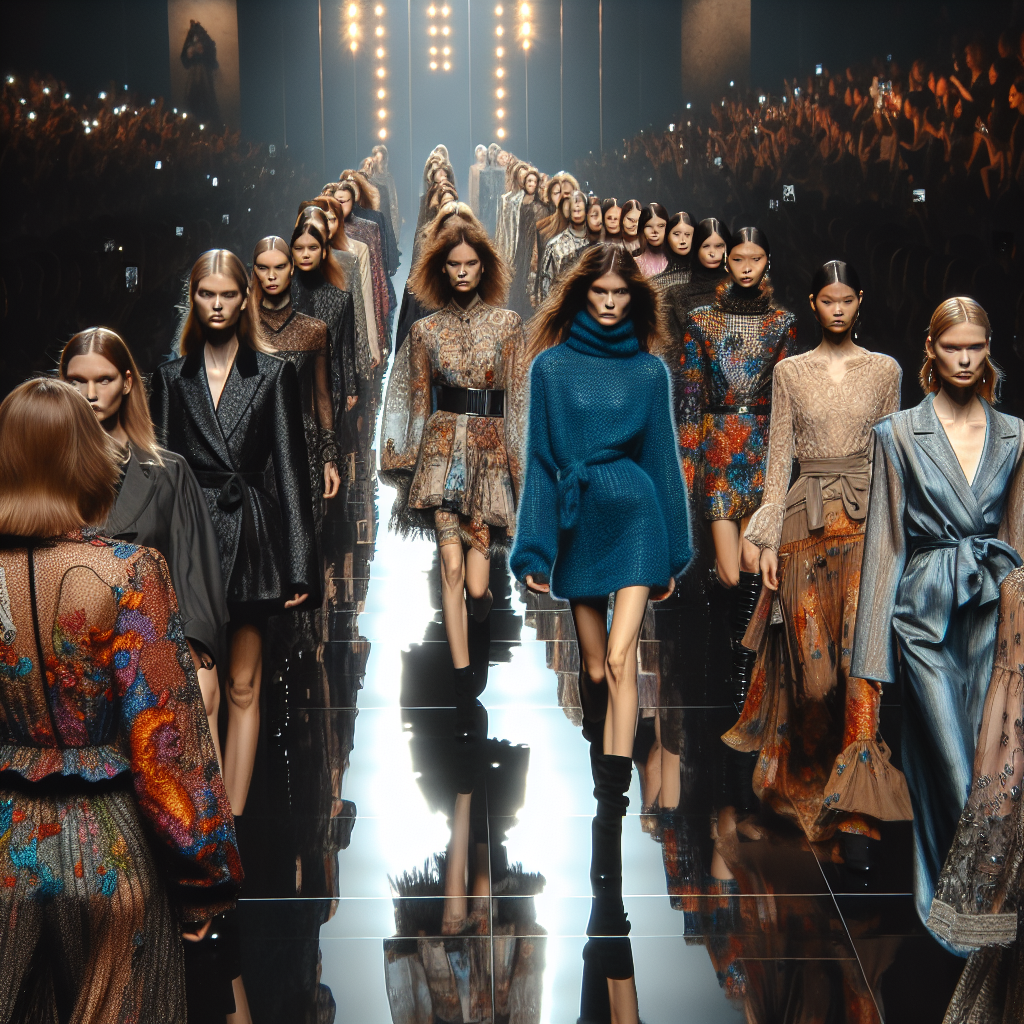As the fashion industry continues to evolve, couture and high-end fashion brands are at the forefront of embracing innovative trends. These trends not only redefine luxury but also reshape the way fashion is perceived and consumed. From integrating advanced technology into design processes to prioritizing sustainability and personalization, high-end fashion is undergoing a transformative phase. This article explores three significant future trends that are shaping the landscape of couture and luxury fashion.
Embracing Technology in High-End Fashion Design
The integration of technology into high-end fashion design is revolutionizing the way couture is conceptualized and created. Designers are increasingly utilizing 3D printing technology to craft intricate designs that were once impossible to achieve by traditional methods. This allows for unparalleled precision and the creation of avant-garde pieces that push the boundaries of fashion. The use of 3D printing is not only enhancing creativity but also reducing waste, as it enables designers to test prototypes without the need for excessive material consumption.
Augmented reality (AR) is another technological advancement making waves in the luxury fashion industry. Through AR, brands are offering immersive experiences that allow customers to visualize how garments will look and fit in a virtual environment. This not only enhances the shopping experience but also aids in reducing return rates, as customers can make more informed decisions. AR is becoming a pivotal tool for high-end fashion brands aiming to merge the physical and digital realms seamlessly.
Artificial intelligence (AI) is playing a crucial role in streamlining the design process for luxury fashion brands. By analyzing vast amounts of data, AI can predict fashion trends and consumer preferences, enabling designers to tailor their collections accordingly. This data-driven approach is helping brands stay ahead of the curve, ensuring their offerings remain relevant and appealing to their target audience. AI is also being used to optimize supply chains, ensuring efficient production and distribution of high-end fashion products.
The advent of smart textiles is another technological trend gaining traction in the couture industry. These innovative fabrics incorporate electronic components, such as sensors and conductive threads, to create garments that can interact with the wearer. From dresses that change color with temperature variations to jackets that can charge electronic devices, smart textiles are redefining what luxury fashion can achieve. High-end fashion brands are increasingly exploring the potential of these textiles to offer unique and functional designs.
Virtual fashion shows are becoming a staple for luxury fashion brands, allowing them to reach a global audience without the constraints of physical venues. By leveraging digital platforms, brands can showcase their collections to a wider audience, providing an inclusive experience for fashion enthusiasts worldwide. These virtual shows often incorporate cutting-edge visual effects, creating a captivating spectacle that rivals traditional runway presentations.
Technology is also facilitating greater collaboration within the fashion industry. Through digital platforms, designers can work with artisans and craftsmen from around the world, blending traditional techniques with modern innovations. This global exchange of ideas is enriching the creative process and leading to the creation of truly unique couture pieces that celebrate cultural diversity and craftsmanship.
Sustainability: The New Couture Standard
Sustainability is rapidly becoming a cornerstone of the couture and high-end fashion industry. As environmental concerns continue to rise, luxury brands are re-evaluating their production processes to minimize their ecological footprint. This shift towards sustainability is not only driven by consumer demand but also by a growing awareness of the fashion industry’s impact on the planet. High-end fashion brands are setting new standards by prioritizing eco-friendly practices and materials.
One of the key aspects of sustainability in couture fashion is the sourcing of materials. Brands are increasingly opting for organic, recycled, and biodegradable fabrics to reduce their environmental impact. By collaborating with sustainable textile producers, luxury brands are ensuring that their collections are both luxurious and environmentally conscious. This commitment to sustainable materials is helping to redefine luxury, emphasizing quality and responsibility over excess.
Couture brands are also embracing circular fashion models, which focus on extending the lifecycle of garments. By designing pieces that are durable and timeless, high-end fashion brands are encouraging consumers to invest in quality over quantity. Additionally, initiatives such as take-back programs and garment recycling are being implemented to reduce waste and promote a circular economy within the fashion industry.
Transparency is becoming a crucial factor in the sustainability efforts of luxury fashion brands. Consumers are increasingly demanding to know the origins of their garments and the ethical practices behind their production. In response, high-end fashion houses are adopting transparent supply chains, providing detailed information about the journey of each piece from conception to completion. This transparency not only builds trust with consumers but also holds brands accountable for their environmental and social impact.
The adoption of sustainable practices is also influencing the design aesthetics of high-end fashion. Designers are finding inspiration in nature and incorporating elements of the natural world into their creations. This trend towards nature-inspired designs not only celebrates the beauty of the environment but also serves as a reminder of the importance of preserving it for future generations.
Despite the challenges, the commitment to sustainability is driving innovation within the couture industry. Luxury brands are investing in research and development to create new sustainable materials and production techniques. This dedication to innovation is not only benefiting the environment but also ensuring that high-end fashion remains at the cutting edge of design and technology.
The Rise of Personalization in Luxury Fashion
Personalization is emerging as a defining trend in the luxury fashion industry, offering consumers a bespoke experience that caters to their individual tastes and preferences. High-end fashion brands are increasingly focusing on creating personalized products and services to enhance customer satisfaction and loyalty. This shift towards personalization is transforming the way luxury fashion is designed, marketed, and consumed.
One of the ways couture brands are embracing personalization is through made-to-order services. By allowing customers to customize various aspects of their garments, from fabric choices to design details, luxury brands are providing a unique and tailored experience. This approach not only ensures a perfect fit but also adds a personal touch that resonates with the consumer’s identity and style.
Advancements in technology are playing a pivotal role in facilitating personalization within the luxury fashion sector. Brands are utilizing digital tools and platforms to offer virtual consultations and fittings, enabling customers to personalize their purchases from the comfort of their homes. These virtual experiences are bridging the gap between traditional in-store interactions and modern digital convenience, offering a seamless and personalized shopping journey.
Data analytics is another tool luxury fashion brands are leveraging to enhance personalization. By analyzing consumer behavior and preferences, brands can offer personalized recommendations and curated collections that align with individual tastes. This data-driven approach not only enhances the shopping experience but also fosters a deeper connection between the brand and the consumer.
Collaborations with artists and designers are also contributing to the rise of personalization in high-end fashion. By offering limited-edition collections and exclusive designs, luxury brands are providing consumers with unique and personalized options that stand out in a crowded market. These collaborations often result in one-of-a-kind pieces that reflect the creativity and vision of both the brand and the artist.
The trend towards personalization is also influencing the marketing strategies of luxury fashion brands. By focusing on storytelling and creating emotional connections, brands are engaging with consumers on a personal level. Personalized marketing campaigns that resonate with individual values and aspirations are helping luxury brands differentiate themselves in a competitive industry.
As personalization becomes increasingly important in the luxury fashion landscape, brands are continuously exploring new ways to enhance the customer experience. From personalized packaging to bespoke services, high-end fashion brands are committed to offering a unique and tailored experience that reflects the individuality of each consumer.
The future of couture and high-end fashion is being shaped by the integration of technology, a commitment to sustainability, and a focus on personalization. These trends are redefining the luxury fashion landscape, offering innovative solutions and experiences that cater to the evolving needs and preferences of consumers. As the industry continues to embrace these changes, couture and high-end fashion brands are poised to lead the way in creating a more sustainable, personalized, and technologically advanced future.










